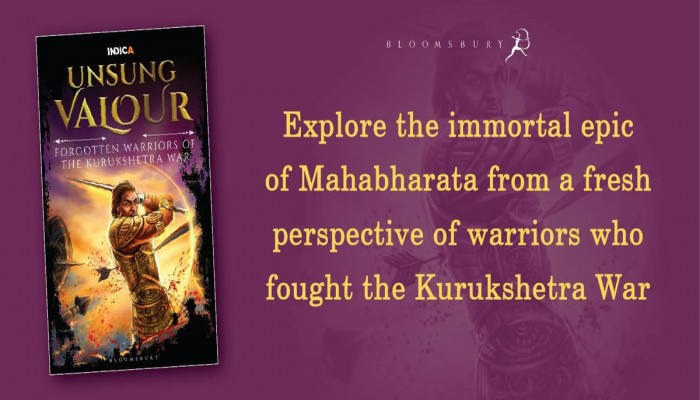Unsung Valour: Forgotten Warriors of the Kurukshetra War
- In Book Reviews
- 05:35 PM, Apr 19, 2021
- S Sudhir Kumar
The Kurukshetra war always fascinated me, ever since I saw B. R. Chopra’s Mahabharata on Doordarshan in the 1990s. Infact, so good were the actors that even today I visualize their faces while reading articles/stories about the war anywhere.
In May 2020, author Sai Swaroopa was doing a series of articles on the Mahabharata war. The series was titled “Kurukshetra: A Quantitative Study”. The series of articles provided great insights into the some of the battles during this war, a quantification of the wins/losses on both sides; the Bhishma, Drona and Karna parvas of the war etc. The articles were simply fascinating in their detail.
Later in the year, Sai Swaroopa and the Indic Academy had announced a contest through which they will select 10 authors to write about the stories of some of the unsung valour of some unknown warriors. Born out that fascinating effort was this equally fascinating book – Unsung Valour.
8 protagonists have been chosen and 10 stories have been written around their role in the war. The book begins with the story of Iravan – the son of Arjuna and Naga princess Ulupi. The chapter very nicely captures the various thoughts going on in the mind of Iravan while he prepares for the war and his role in it. What stuck to me was how quickly the author brings us up to speed on who Iravan is and how he grew up revering his father. The description of the various tactics used by Iravan in the war to win on some days also made very good reading. The final battle between Iravan and Alambusha is captured in great imaginative detail. You would actually finish reading the first chapter “The fall of the first son” with a very heavy heart.
I thought that the second story – “Shakuni: The Dice of Death” will be very predictable. The chapter is about Shakuni and his valour on the battlefield. However, this chapter fascinated me the most in the entire book. The way the author describes the demons in Shakuni’s mind; the way he writes about Shakuni seeing Draupadi everywhere – I was simply blown away by the writing style of all of this. Especially by how the author explains how Shakuni thinks each warrior is blinded by something or the other and then how he ends it with – “How ironic that he who led along with the great blind luminaries of Hastinapura, would be startled awake and frightened of Draupadi’s eyes” – really an exquisite style of writing this is!
Jayadratha gets two stories in the book. “The Invincible” describes in great detail on how Jayadratha stopped the four Pandavas (and their entire army) from entering the Chakravyuha. The attention to detail while describing that particular battle was yet another example of exquisite writing. Your mind is vivid with imagination on how the battle happens between Jayadratha and the pandavas, the panchalas etc. While you are bound to get sad at how the day ended with Abhimanyu’s death, through this chapter, you also get a great insight into why Jayadratha has such pent up anger against the Pandavas and how he was able to ward them off on that particular day.
The second chapter that Jayadratha gets in the book is actually about his killing The last chapter of the book “The Killing of Jayadratha” also explains in great detail the planning that went on both sides – Pandavas on how to kill Jayadratha; Kauravas on how to save him! By the time I reached the last chapter, I had already gotten used to the high quality of writing in the book. Little did I know that a surprise was awaiting at the end of the chapter. The “About the author” was infact a shock – “Abhyuday Kiran Hadal is a high school student…” I couldn’t believe my eyes that this chapter was written by a high school student! I really hope and pray that Abhyuday continues to write like this and shine in his life!
Jayadratha is not the only one to get two chapters in the book. Bhima’s son and the rakshasha king, Ghatotkacha also gets two stories in the book. From reading the “The Indra among the Rakshasas” I had come to know that even Ghatotkacha’s son participated in the war! The mighty Bhima was a grandfather when the war was happening! Both Ghatotkacha and his son die on the same day in the war and this chapter makes some poignant towards the end. In “The redeeming of Ghatotkacha”, we are given a very good glimpse into the mind and thoughts of Ghatotkacha; and his valour on the day of his death.
While reading about the killing of Jayadratha, we often read about Arjuna’s valour in accomplishing his oath. At least for me, for the first time, I was able to read in great detail how he was ably helped by other warriors. “Day of Great Oath: Mission Jayadratha” tells us the story of Yudhamanyu and Uttamouja. Both these warriors are tasked with protecting the wheels of Arjuna’s chariot. Your imagination is sparked with the great detail that the author provides in how these two warriors perform the job given to them – especially when both of them realise that they are doing something wrong and have to change their strategy so that they can keep up pace with Arjuna. This chapter infact is a good read to understand how team work actually helps well in accomplishing goals!
Another fascinating story is that of Yuyutsu. The chapter on him is rightly titled “The righteous traitor” given how despite being the son of Dhritarashtra, he choses to fight from the side of Pandavas. Like all the chapters, not only does the story give a very good glimpse into this thought process and his valour in the war, we are also told about how his growing up years have shaped his dislike for Kauravas.
Not everyone on Pandava’s side had exemplary talent – the last people we would expect to not be greatly talented would be the sons of Pandavas (from Draupadi). “The mediocre son” walks us nicely through the mind, (laziness!) and strategy of Prativindhya, son of Yudhistra and Draupadi.
We all celebrate Naraka Chaturdasi with great fervour. Little did I know that Naraka’s son, King Bhagadatta fought on the Kaurava’s side in the Kurukshetra war. In the chapter – “Bhagadatta: The warrior king from the east”, we are treated to yet another exquisite war-writing. Our imagination is yet again lit while reading how Bhagadatta along with his elephant Supratika actually wins a battle with Bhima and Ghatotkatcha!
While reading the “Unsung Valour”, you will actually find it very difficult to believe that 10 different authors wrote these stories in the book. And I think the credit must go to the curator of this effort - Sai Swaroopa and the Indic Academy. A special workshop was conducted for these writers to fine tune their exceptional talents. The talent and training are very evident in the high-quality writing that I got to read. Your imagination is always active while reading this book. The Indic Academy, Sai Swaroopa and the 10 authors definitely deserve a round of applause. And the youngest of them all – Abhyuday Kiran Hadal – deserves a bigger pat in the back for debuting!
Image obtained from Twitter.







Comments